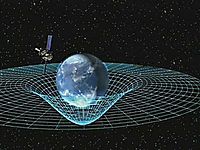
Photo from wikipedia
In this article, the investigation is centered around the quantum estimates by utilizing quantum Hahn integral operator via the quantum shift operator ψ q η ( ζ ) = q… Click to show full abstract
In this article, the investigation is centered around the quantum estimates by utilizing quantum Hahn integral operator via the quantum shift operator ψ q η ( ζ ) = q ζ + ( 1 − q ) η ${}_{\eta}\psi_{\mathfrak{q}}(\zeta)=\mathfrak{q}\zeta+(1-\mathfrak{q})\eta$ , ζ ∈ [ μ , ν ] $\zeta\in[\mu,\nu]$ , η = μ + ω ( 1 − q ) $\eta=\mu+\frac{\omega}{(1-\mathfrak{q})}$ , 0 < q < 1 $0<\mathfrak{q}<1$ , ω ≥ 0 $\omega\geq0$ . Our strategy includes fractional calculus, Jackson’s q $\mathfrak{q}$ -integral, the main ideas of quantum calculus, and a generalization used in the frame of convex functions. We presented, in general, three types of fractional quantum integral inequalities that can be utilized to explain orthogonal polynomials, and exploring some estimation problems with shifting estimations of fractional order ϱ 1 $\varrho_{1}$ and the q $\mathfrak{q}$ -numbers have yielded fascinating outcomes. As an application viewpoint, an illustrative example shows the effectiveness of q $\mathfrak{q}$ , ω -derivative for boundary value problem.
Journal Title: Advances in Difference Equations
Year Published: 2020
Link to full text (if available)
Share on Social Media: Sign Up to like & get
recommendations!